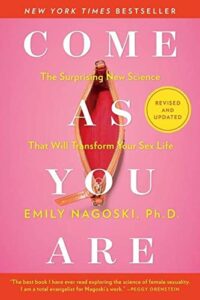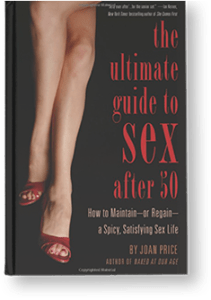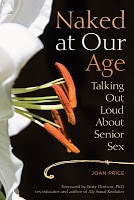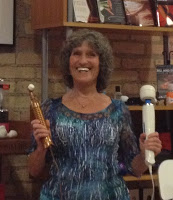Posts Tagged ‘“best of” Joan’s blog’
When Sexual Desire Changes – and What to do About It
“I just don’t feel sexual desire anymore,” many senior women tell me. They miss the excitement, pleasure, and intimacy of sex, and they ask me how to fix this. Others have decided that they’re done with sex and wish their partners would stop pressuring them. Often the lovers and spouses are the ones who reach out to me: “My partner doesn’t desire sex with me anymore, and it’s killing me.”
Many seniors find that sex continues to be terrific, even better than ever, and finally we’re talking out loud about that. But those who avoid sex out of lack of desire usually think that’s just the way things are when we age — but that’s not true!
Spontaneous vs responsive desire
As we age and hormones recede, we may not feel that biological urge or drive for sex anymore. Our bodies and brain don’t automatically kick into gear, even with someone who would have inspired us to peel off our clothes a few decades ago. In fact, there’s nothing “automatic” about our sexual responses at all. That doesn’t mean you don’t feel desire. It means you don’t feel “spontaneous desire,” which is biologically driven, propelled by hormones.
As we age, spontaneous desire wanes, that’s normal. But that isn’t the only way to experience desire, and it doesn’t have to close down our sexual pleasure.
“Responsive desire” means that you feel desire in response to pleasure and arousal. In other words, instead of having sex because you feel desire in advance, you’re letting yourself relax and open to the pleasure and stimulation of physiological arousal. Then the desire will kick in.
How do you know if this is relevant to you personally? Do you ever resist sex at first because you’re not particularly in the mood, but once you get started, your arousal grows and then you’re really into it? That’s responsive desire. That’s especially true if, at the end, you say, “Wow, that was good. Why don’t we do that more often?”
As Emily Nagoski, Ph. D, explains in Come As You Are: The Surprising New Science That Will Transform Your Sex Life:
The standard narrative of sexual desire is that it just appears – you’re sitting at lunch or walking down the street, maybe you see a sexy person or think a sexy thought, and pow! You’re saying to yourself, “I would like some sex!” This is how it works for maybe 75 percent of men and 15 percent of women…That’s “spontaneous” desire.
But some people find that they begin to want sex only after sexy things are already happening. And they’re normal. They don’t have “low” desire, they don’t suffer from any ailment… Their bodies just need some more compelling reason than, “That’s an attractive person right there,” to want sex.
For more about women’s sexual desire and response, I heartily recommend Nagoski’s book. Read more about spontaneous vs. responsive desire.
How to talk with your partner
Lack of communication makes lack of desire far worse. The jilted partner thinks, “It’s me. My lover doesn’t desire me anymore.” The partner who’s been turned away over and over feels frustrated, alone, unloved, unwanted. They may decide that cheating, leaving, or becoming a monk are the only options. Soon it’s not just sex that feels mismatched — it’s the whole relationship.
Don’t let that happen. Talk to each other openly, lovingly, without blame. Listen to each other without interrupting. Ask for clarification. When you respond to the other, explain your feelings without arguing or coming across as defensive.
Read these sample scripts. Would one of them help get you started? If not, write your own.
• “I admit I’ve been resisting sex lately and I know this hurts you. I love you very much, and I’d like to explain what’s going on for me and hear how you feel.”
• “I’m having difficulty feeling sexual desire. It’s not you — it’s how my body is working these days. I’ve learned about something called ‘responsive desire’ that I’d like to tell you about. Then let’s try it.”
• “I’d like to try a no-goals cuddle time where we’re naked in bed, holding each other, with no assumption that it has to lead to sex. If it does, we’ll enjoy it. But if it doesn’t, we’ll still enjoy holding each other.”
If you can’t have this kind of conversation on your own successfully, please enlist the help of an age-positive, sex-positive couples’ counselor or a sex therapist. The future of your relationship may depend on it.
What to do instead of waiting to be in the mood
(excerpted from “Getting Your Mojo Back” in The Ultimate Guide to Sex after 50:
How to Maintain – or Regain – a Spicy, Satisfying Sex Life)
I can’t emphasize enough how important it is to approach our sexuality in this new way: Relax, start getting physically aroused, emotional arousal will happen, and voila, we’ll be in the mood. So the key is to commit to regular sex, partnered or solo. How does this translate to real life?
Here are some tips:
• Schedule sex dates with your partner and/or with yourself.
• Create rituals with your partner that signal sex would be welcome.
• Allow plenty of time for warm up.
• Make sex a habit. The more you do it, the more you’ll want to do it.
Final word
“You may have just saved my marriage,” a woman told me after I explained responsive desire at a presentation. Incorporate this into your sex life — you may feel the same!

====
This article originally appeared as part of Lion’s Den Senior Sex Month, July 2022, at https://www.lionsden.com/blog/when-desire-changes.

How to Choose a Vibrator
 Seniors often ask me, “What’s the best vibrator?” I’m happy to help, but the answer isn’t that easy. The question usually comes from people who never used vibrators in the past, or who tried vibrators but never got attached (so to speak) to them. Now they discover orgasms are elusive, and they need an assist to intensify sensation, ramp up arousal, and reach orgasm.
Seniors often ask me, “What’s the best vibrator?” I’m happy to help, but the answer isn’t that easy. The question usually comes from people who never used vibrators in the past, or who tried vibrators but never got attached (so to speak) to them. Now they discover orgasms are elusive, and they need an assist to intensify sensation, ramp up arousal, and reach orgasm.
I’ve reviewed more than a hundred vibrators on this blog over the last decade, and tested many more that I decided not to review. My blog reviews screen for the best vibrators for our age group and give you the pros and cons of each. Despite all my experience, I can’t tell you which one is “best.” That’s not an inadequacy on my part, it’s because the vibrator that’s best for you depends on many factors.
Your first step is figuring out exactly what you need. We’re all different, and your own needs and preferences will determine which vibrator will become your best friend. Let me guide you through how to sort through the many possibilities.
How Do I Get Started With Vibrators?
Start by answering these questions:
- How will you use your vibrator? I know, you’ll press it against your sexy bits to give you orgasms, but how and where? Do you want a vibrator that stimulates your clitoris? Goes into your vagina? Does both at the same time? Are you seeking a penis stimulator? If so, do you specifically want one that can be used whether or not you have an erection? Will you use your vibrator solo or during partner sex? Do you want it to double as a back massager?
- Do you care what it looks like? Some women want a sex toy to look like a penis. Others really don’t want it to look like a penis. Some want it not to look like a sex toy at all.
- How should it feel against your skin? Vibrators can be firm, flexible, cushiony, hard, soft, textured, smooth and any other tactile quality you can think of.
- How strong should the vibrations be? Do you want your vibrator to be quiet and whisper-light, turbo power, earth-shaking strong, or something in between?
- How much does noise matter? Will you worry that your neighbors in the next apartment or a family member in the next room can hear it?
- What size is too big, too small, just right if this is a penetrating toy? Sometimes a size that would have felt perfect 30 years ago is just too girthy and uncomfortable for us now, especially if we’re not having regular penetrative sex.
- Do you have mobility restrictions or other physical issues to consider? Is wrist arthritis an issue for holding a vibrator? What position will you be in when you use it?
- What else is important to you? This is completely individual. You may want it to be no-brainer easy to use: off, on, that’s it. Or you may relish multiple patterns, rhythms and intensities, and not mind a bit of a learning curve. You may want the controls to be comprehensible by touch without your reading glasses. You may want to travel with it.
Once you’ve answered these questions, you’re ready to start narrowing your choices.
Never underestimate the power of a good orgasm, whether it’s vibrator-assisted or not. At this time in our lives, catching that evasive orgasm can be difficult. Make it easier with the right tool!

How do I Choose the Right Vibrator and Purchase Online?
Read online reviews. I review sex toys from a senior perspective on this blog, taking into consideration intensity, ease of use, body-safe materials, etc. Click “vibrator review” and keep reading and scrolling until you find those that match your criteria. Shamus MacDuff reviews penis vibrators: click “https://joanprice.com/tag/sex-toys-for-penis.”
Links to order from the reputable retailers that I endorse are included within each review. If you’d like to compare several vibrators, choose a retailer from my advertisers and affiliates. (Find their banner links in the right-hand column of my blog if you’re using a computer, or scroll past a few posts if you’re using your phone.) These folks support me in providing senior sex education to you, and I’ve vetted each one as a high-quality, reputable online store.
The most entertaining way to learn more about some of my favorite sex toys is to view my webinar, Sex Toys for Seniors. In this 90-minute online class, I do a lively show-and-tell, covering these topics:
- My criteria for evaluating sex toys

- 8 questions to help you choose your personal vibrator.
- 5 myths and facts about vibrators.
- Show-and-tell: my highly recommended sex toys for seniors.
You’ll also find a ton of sex toy information in my book The Ultimate Guide to Sex after Fifty, including how to buy sex toys made of body- safe materials (the cheaper ones may not be). You’ll also find info on every other senior sex topic!
safe materials (the cheaper ones may not be). You’ll also find info on every other senior sex topic!
10 Tips for Hot Solo Senior Sex
 Senior sex isn’t just partner sex. Many of us don’t have partners, yet keeping our sexual selves vibrant and health is crucial for many reasons. It’s true that if we don’t use it, we lose it — and that’s true for both women and men.When we have less hormonal rush to stay sexual, especially if we’re without a partner and maybe blue about that, we can fall into a pattern where we don’t think as much about sexual pleasure, and we don’t give it to ourselves. Arousal and orgasms may feel second-rate and inconsequential, and sometimes just too much trouble.
Senior sex isn’t just partner sex. Many of us don’t have partners, yet keeping our sexual selves vibrant and health is crucial for many reasons. It’s true that if we don’t use it, we lose it — and that’s true for both women and men.When we have less hormonal rush to stay sexual, especially if we’re without a partner and maybe blue about that, we can fall into a pattern where we don’t think as much about sexual pleasure, and we don’t give it to ourselves. Arousal and orgasms may feel second-rate and inconsequential, and sometimes just too much trouble.
Instead, let’s see our marvelous bodies as still capable of pleasure, and let’s nurture that. We have the capacity — and the responsibility! — to keep ourselves fully functioning by pleasuring ourselves, discovering what feels good (it may have changed, so don’t assume that of course you know) and what it takes to make our brains and body parts sing. Let’s celebrate that we don’t have to close down just because we’re older and partnerless. Indeed, let’s enjoy what we can offer ourselves.
Here are some tips for bringing the sizzle back to your sex life — on your own!
2. Enjoy solo sex during high energy times. When do you feel most sexually charged? When you first wake up? After morning coffee and a good poop? Mid-afternoon? That’s when to indulge in a solitary romp, rather than after a meal when you’re digesting or at night when your sensations are shutting down. When you feel the tingle, indulge it!
3. Create your own foreplay. Do sexy things that get you in the mood. Remember hot times with a special lover. Read erotica, play special songs, watch porn (or, if you prefer, a movie with a star who always turns you on), write sexy thoughts in your journal, take a waterproof vibrator into the bath or shower — whatever starts your path to arousal. Appreciate, decorate, and celebrate your body with lingerie, silk, velvet, massage oil, candlelight–whatever feels good and puts you in the mood.
4. Use a silky lubricant. Don’t just settle for the drugstore variety — there are many different varieties of lubricants for moisture and slickness that feel great and bring back the joy of friction, whether we’re using our hands or a toy. Experiment to find your favorites. Keep the lube within reach so you can reapply frequently.
5. Explore sex toys and other erotic helpers. Our hormonally challenged bodies may need extra help to reach orgasm these days, and our wrists may tire before we reach our goal. Women: try a clitoral vibrator, with or without a dildo, depending whether you like the feeling of a full vagina. (Read the many vibrator reviews on this blog to help you choose.) Men: try a sleeve, cock ring, or prostate stimulator. Lucky for us that sex toys for both genders are easy to find, fun to try, and wow, do they work!
6. Fantasize. Let yourself explore fantasy scenes and partners, no limits. Let your brain (your main sex organ!) indulge in whatever arouses you. Be open to whatever comes into your mind, even if it is something you would not do in real life or with someone you consider off limits. No fantasy is “wrong,” and no one has to know what images or scenarios turn you on. Just go with it.
7. Be physical in daily life. Walking, biking, dancing, yoga, Pilates, lifting weights, and other forms of exercise all enhance blood flow and get you in touch with your own physicality. This translates to your sexual arousal because the blood flows to your genitals as well as to your muscles, making arousal easier and faster. Plus you mentally feel “in your body.”
8. Realize that your solo practice not only gives you pleasure, it’s important for health. Experts recommend at least one orgasm a week for both men and women for genital health and for heart health as well. Weekly orgasms keep the pelvic floor strong and the nerves firing, boost the immune system, and reduce the risk of incontinence, depression, and heart disease. Men – regular orgasms are important for prostate health.
9. If you think you’re not in the mood, do it anyway. It’s too easy to put solo sex on the back burner, and once we’re out of the habit, it’s harder to get revved up again. This is especially true at our age, when our hormones are no longer screaming for release. So reread tips #1-8, and just do it. You’ll find that the physical arousal will happen, that that will trigger your emotional arousal, and that triggers more physical arousal, until it’s all working just right.
10. Don’t think of solo sex as “settling for” a substitute for partner sex. You’re celebrating your own sexuality, glorying in your body’s capability of pleasing you, and enjoying the journey. This is a gift you can give yourself whenever you want, and isn’t that wonderful?
(These tips are copyright 2010-2011 by Joan Price and may not be reprinted without permission from Joan Price. Thank you!)

 Naked at Our Age: Talking Out Loud about Senior Sex is available from www.joanprice.com (personally autographed) — be sure to let me know to whom to autograph it — and by clicking the PayPal button below…
Naked at Our Age: Talking Out Loud about Senior Sex is available from www.joanprice.com (personally autographed) — be sure to let me know to whom to autograph it — and by clicking the PayPal button below…![]()
Senior Sex & Vibrators: Myths & Facts
I updated this published post because you continue to ask me intriguing questions about sex toys (especially vibrators for older women), both out loud and by email. I continue to hear some misconceptions I’d like to clear up. As always, I welcome your comments.
A: Actually, it’s the opposite. As women’s bodies age, we get less blood flow to the clitoris and vagina, and the vaginal walls get thinner. Most of us need more arousal time and more time to reach orgasm after we’re aroused. Vibrators enhance sensitivity by increasing blood flow to the genitals quickly and powerfully, and by directly stimulating the clitoris. (The clitoris is our #2 pleasure hot spot — #1 is our brain!) A well-chosen, well-placed vibrator can mean the difference between an orgasm — and no orgasm. The more orgasms we have, the more easily we reach orgasm the next time. So using a vibrator to get us over the edge actually enhances sensitivity and ease of reaching orgasm.
 A: Not a chance. A vibrator may give quicker orgasms (that’s what it’s made for, after all), but it doesn’t cuddle well or kiss or laugh, and pillow talk with a vibrator is really boring. It either buzzes or it doesn’t. It’s a dull companion — except when we need a sexual assist. If a woman prefers a sex toy to the exclusion of her lover, it’s a signal that there’s a bigger problem in the relationship than sex toys.
A: Not a chance. A vibrator may give quicker orgasms (that’s what it’s made for, after all), but it doesn’t cuddle well or kiss or laugh, and pillow talk with a vibrator is really boring. It either buzzes or it doesn’t. It’s a dull companion — except when we need a sexual assist. If a woman prefers a sex toy to the exclusion of her lover, it’s a signal that there’s a bigger problem in the relationship than sex toys.
Q: My man says I should reach orgasm “naturally” and not have to use a sex toy. But I just can’t come during intercourse unless I add my vibrator at the right moment.
A: I hate those “should’s.” Most women do not come through intercourse alone, and that gets truer the older we get. Point out to him where his penis contacts you during intercourse vs. where your clitoris resides.
And when he arouses you manually, which I hope he does, point out that he’s less likely to get carpal tunnel syndrome from your long arousal time if he incorporates a vibrator in arousal play.
That’s right, it’s not a choice between him or it — make it a threesome: the two of you using the vibrator together.
Q: I had two friends who burned themselves with sex toys. Aren’t they dangerous?
A: The cheaper ones are cheap for a reason. They generally have no quality standards in materials or construction — they’re called “novelty items,” and I don’t recommend them.
If your eyes widen at the price of the vibrators I recommend on this blog, consider that I only recommend safe products of medical-grade materials, careful construction, and the best design and function for our older (still sexually passionate!) bodies.
You’re paying for research and development and high-quality material that won’t degrade, melt, leach nasty chemicals into your body, break, overheat, or burn. That’s also why I recommend shopping in woman-friendly sex shops (brick-and-mortar or online) with an emphasis on health and education, like the ones I link to.
Q: You recommend going into a sex toy store and asking questions. But when I do, I see workers who are the age of my grandchildren! I’d be horrified to talk about sex with them.
 A: I’m often invited to visit education-focused sex toy stores to help the staff understand our needs better. I’m always impressed by how well-trained they are already, and how seriously they take their mission to provide sex education to everyone.
A: I’m often invited to visit education-focused sex toy stores to help the staff understand our needs better. I’m always impressed by how well-trained they are already, and how seriously they take their mission to provide sex education to everyone.
We mistakenly assume that if they’re the age of our grandchildren, (a) they don’t know much; and (b) we can’t possibly talk about our sexual concerns with them.
But in reality, they’re smart, well-educated “sex nerds” — meaning that they find sex information the most fascinating topic ever. They have knowledge that will help us enrich our sex lives. They want us to feel comfortable asking them questions. It’s up to us to meet them with a smile and a question, and give them a chance to help us.
Please see my many other posts about sex toys here, including reviews of specific products, with links to retailers I personally endorse because they value people of our age and treat us well.

Note to retailers: Do not spam my comments section, because I’ll delete any comment that takes my readers to a retail site I have not endorsed. If you think you should be included in the retailers I endorse, contact me personally. Thank you. — Joan


